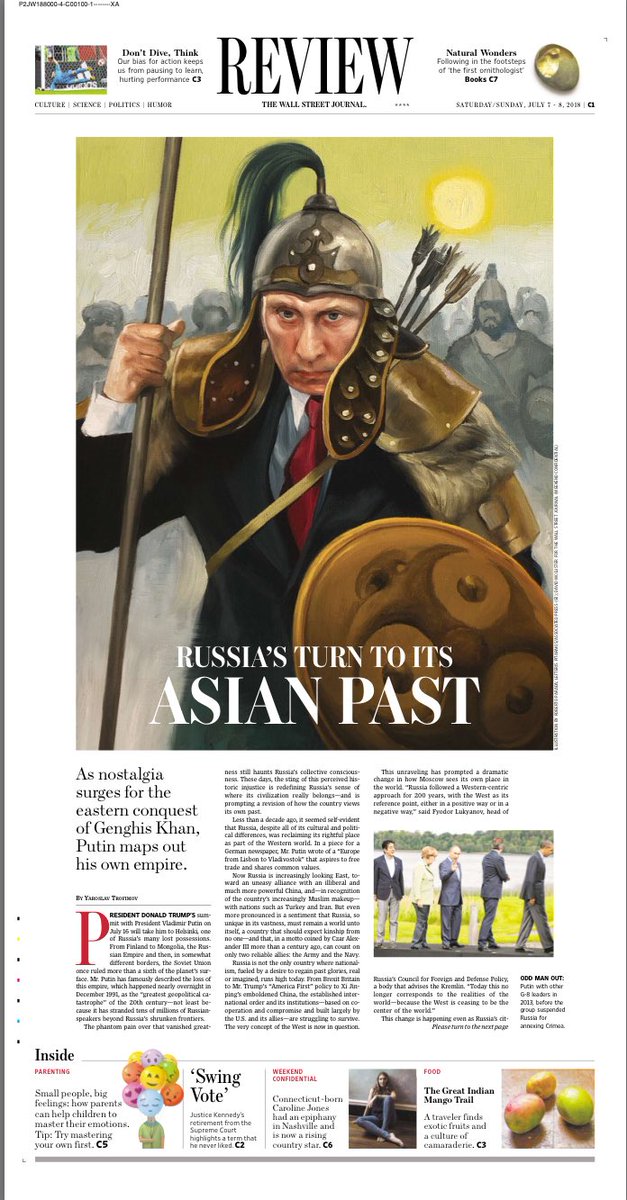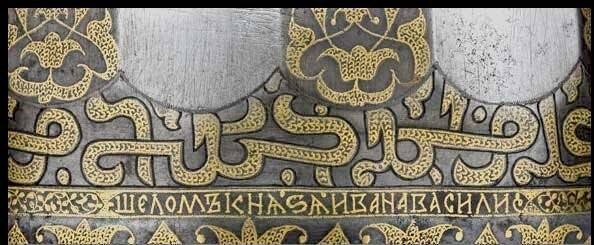- Joined
- Sep 2, 2017
- Messages
- 33,607
- Reaction score
- 5,193
- Location
- GDL/Sweden
- Gender
- Male
- Political Leaning
- Centrist
finally ....
"According to scholar Tjundeshev, Batu Khan was the true founder of Russian statehood. China, India and Turkey also descend from the Tatars. For him, “it is so difficult for Russians to learn to be free; they always need a strong hand to rule them." Russia’s isolationism is also Tatar in nature. Foreigners are seen as enemies. Telegram, the instant messaging service, has been blocked."
Descent from Genghis Khan - Wikipedia

RUSSIA Putin, heir to the Mongol Grand Khans
more
"Moscow (AsiaNews) – A recently published book has generated a lot of buzz in Russia. Titled The Great Batu Khan, founder of Russian Statehood (Великий хан Батый – основатель Российской государственности), the tome is by Gennady A. Tjundeshev (Haramos), a historian at Khakassia State University (in Asian Russia, where Tatar-Mongols hail from).
Its publication has revived the memory of the times of the "Tartar yoke", when Russia was under Asian rule for more than two centuries, between the 13th and the 15th centuries. It has also inspired some comparisons, especially with President Putin, who was re-elected on 18 March and has acquired the status of tsar and great leader.
The great Batu Khan was the grandson of Genghis Khan, who, in 1240, imposed the dominion of the so-called "Golden Horde" on the principalities of ancient Kievan Rus, which disappeared from history as a separate entity.
The Tatars were defeated for the first time in 1380 in the Battle of Kulikovo. Dmitry Donskoj, Prince of Moscow, led the way inspired by Sergius of Radonezh. Eventually, the city of Kyiv (Kiev) was against itself by the 17th century, but Asian domination ended only in 1480 thanks to the great prince Ivan III, father of the ideology of Moscow as the Third Rome. According to Tjundeshev’s interpretation, Russia has never freed itself from the legacy of the Tatar Khans; instead, it has made it the basis of its civilisation and state organisation.
The idea is not particularly new. Napoleon, contemplating Moscow burning in 1812 from the walls of the Kremlin, uttered his famous words: “Scratch a Russian, you find a Tatar”. Many historians recognise the importance of the rule of the Golden Horde in the development of Russian society. The word money, dénʹgi (деньги), comes from Mongolian and survives in the memory of the taxes that Russians had to pay to the Khans to obtain formal diplomas, Jarliq (ярлык), which today means label, price tag, in modern Russian. Thus, today’s Russia is more the offspring of the Golden Horde than Kievan Rus. Tsar Ivan the Terrible, who conquered the last Kazan khanate in the 1500s, incorporated the main Mongolian leaders into the Russian administration. The tsar of "Holy Russia", to whom many today compare the reigning president (Ivan IV and Putin IV), dropped out of government for a whole year, putting one of his Mongol khans, Simeon Bekbulatovich, in his place.
On 19 April, in an interview with Radio Svoboda, Tjundeshev reiterated his thesis. "The Golden Horde introduced the imperial spirit to Russia, and Batu Khan was the true founder of Russian statehood [. . .]. The mindset of Russians is mainly Asian. Even if the population is of European stock, only a small minority think within European parameters. This is why,” says the Tatar scholar, “it is so difficult for Russians to learn to be free; they always need a strong hand to rule them.”
“In the Russian Duma everyone always votes as the president wants, like in the Kurultáj of Genghis Khan. The founder of the Mongol Empire at the beginning of the 13th century was in reality a very advanced man for his time, able to adapt to different situations and different cultures, including religions. From the Tatars come nations such as China, India, Turkey and Russia, which embrace different faiths like Confucianism, Islam and Orthodox Christianity.”"
"According to scholar Tjundeshev, Batu Khan was the true founder of Russian statehood. China, India and Turkey also descend from the Tatars. For him, “it is so difficult for Russians to learn to be free; they always need a strong hand to rule them." Russia’s isolationism is also Tatar in nature. Foreigners are seen as enemies. Telegram, the instant messaging service, has been blocked."
Descent from Genghis Khan - Wikipedia

RUSSIA Putin, heir to the Mongol Grand Khans
more
"Moscow (AsiaNews) – A recently published book has generated a lot of buzz in Russia. Titled The Great Batu Khan, founder of Russian Statehood (Великий хан Батый – основатель Российской государственности), the tome is by Gennady A. Tjundeshev (Haramos), a historian at Khakassia State University (in Asian Russia, where Tatar-Mongols hail from).
Its publication has revived the memory of the times of the "Tartar yoke", when Russia was under Asian rule for more than two centuries, between the 13th and the 15th centuries. It has also inspired some comparisons, especially with President Putin, who was re-elected on 18 March and has acquired the status of tsar and great leader.
The great Batu Khan was the grandson of Genghis Khan, who, in 1240, imposed the dominion of the so-called "Golden Horde" on the principalities of ancient Kievan Rus, which disappeared from history as a separate entity.
The Tatars were defeated for the first time in 1380 in the Battle of Kulikovo. Dmitry Donskoj, Prince of Moscow, led the way inspired by Sergius of Radonezh. Eventually, the city of Kyiv (Kiev) was against itself by the 17th century, but Asian domination ended only in 1480 thanks to the great prince Ivan III, father of the ideology of Moscow as the Third Rome. According to Tjundeshev’s interpretation, Russia has never freed itself from the legacy of the Tatar Khans; instead, it has made it the basis of its civilisation and state organisation.
The idea is not particularly new. Napoleon, contemplating Moscow burning in 1812 from the walls of the Kremlin, uttered his famous words: “Scratch a Russian, you find a Tatar”. Many historians recognise the importance of the rule of the Golden Horde in the development of Russian society. The word money, dénʹgi (деньги), comes from Mongolian and survives in the memory of the taxes that Russians had to pay to the Khans to obtain formal diplomas, Jarliq (ярлык), which today means label, price tag, in modern Russian. Thus, today’s Russia is more the offspring of the Golden Horde than Kievan Rus. Tsar Ivan the Terrible, who conquered the last Kazan khanate in the 1500s, incorporated the main Mongolian leaders into the Russian administration. The tsar of "Holy Russia", to whom many today compare the reigning president (Ivan IV and Putin IV), dropped out of government for a whole year, putting one of his Mongol khans, Simeon Bekbulatovich, in his place.
On 19 April, in an interview with Radio Svoboda, Tjundeshev reiterated his thesis. "The Golden Horde introduced the imperial spirit to Russia, and Batu Khan was the true founder of Russian statehood [. . .]. The mindset of Russians is mainly Asian. Even if the population is of European stock, only a small minority think within European parameters. This is why,” says the Tatar scholar, “it is so difficult for Russians to learn to be free; they always need a strong hand to rule them.”
“In the Russian Duma everyone always votes as the president wants, like in the Kurultáj of Genghis Khan. The founder of the Mongol Empire at the beginning of the 13th century was in reality a very advanced man for his time, able to adapt to different situations and different cultures, including religions. From the Tatars come nations such as China, India, Turkey and Russia, which embrace different faiths like Confucianism, Islam and Orthodox Christianity.”"


